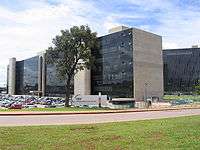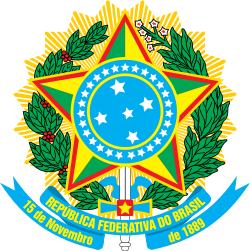Superior Labour Court
The Superior Labor Court or Tribunal Superior do Trabalho (TST), in Portuguese, is the highest Brazilian appellate court for labor law issues. Its headquarters are located in Brasilia, near the American Embassy.

 |
|---|
| This article is part of a series on the politics and government of Brazil |
|
|
|
Administrative divisions
|
|
|
It is one of the five high courts in Brazil.
It is the highest instance in the Brazilian federalized labor courts system, which includes the Regional Labor Courts (Tribunais Regionais do Trabalho - TRT's), at common appeal level, and the Trial Labor Courts (Varas do Trabalho) in the first instance level.[1]
History
The origins of that court remonts the National Labor Council, created in 1923, which was a part of the Federal Executive Branch, subordinated to the Ministry of Agriculture, Industry and Commerce.[2]
In 1946 the Council was transformed in the Tribunal Superior do Trabalho. The Brazilian Constitution adopted in that same year recognized the TST as part of the Judiciary Branch, no longer subordinated to the Executive Branch. That basic situation was kept by all subsequent Constitutions.
Since its origins, that Court was integrate by both effective Ministers and temporary class Ministers. The effective Ministers (nicknamed "togados" after the distinctive robes - "togas" - which they wear) were considered Magistrates for all legal prerogatives, while the Temporary Classist Ministers ("classistas"), which were paritary representatives of both patrons em employers ("classes"), were pointed for a fixed term (usually 3 years) and had fewer powers and prerogative. The Classists Ministers were abolished by a constitutional amendment in 1999, subsisting only the effective Ministers.
Composition
By the actual legislation,[3] the Court is integrated by 27 members, entitled Ministers (Ministros), pointed by the President of Brazil. The nomination only occurs after the approval of the Senate. All the nominated members must be at least 35 and no more than 65 years old, must have Brazilian nationality and moral integrity, plus all the requirements to enter in a public service career (e.g. having fulfilled military conscription and electoral duties).
There are 3 positions reserved lawyers, indicated by the Order of Attorneys of Brazil (the official Bar association), 3 for members of the Public Ministry, and the remaining 21 for career judges of the Regional Labor Courts.
References
- Wikipédia (portuguese)
- Do CNT ao TST - Breve Histórico(portuguese)
- Art. 111-A of the Brazilian Constitution of 1988, with the text of the 45th amendment, of 2004 (portuguese)
External links
- Official website (Portuguese)
See also
- Brazil federal courts